
The first episode of ESPN's & @SECNetwork Southern Basketball aired last Monday. A few thoughts on it. 🧵
First it's hard to know what this series wants to be about. Presumably SEC men's basketball but it veers heavily into other areas. (Integration and Women's Hoops).
First it's hard to know what this series wants to be about. Presumably SEC men's basketball but it veers heavily into other areas. (Integration and Women's Hoops).

Not that those aren't important topics, they are. But they honestly deserve their own documentaries.
Integration of basketball is important & certainly a major part of the story, but it is so much bigger than just the SEC. It's much bigger than just the South.
Integration of basketball is important & certainly a major part of the story, but it is so much bigger than just the SEC. It's much bigger than just the South.
I haven't seen the ACC documentary but that was a 10-part 10 hour documentary on just the ACC men's tournament which started in 1954.
espnpressroom.com/us/press-relea…
To try to cover so much territory with SEC basketball in just 7 episodes seems to require a superficial treatment.
espnpressroom.com/us/press-relea…
To try to cover so much territory with SEC basketball in just 7 episodes seems to require a superficial treatment.
The decision to start in 1930 was somewhat odd. As a UK fan I appreciate they honed in on Adolph Rupp's arrival in Lexington but I don't know fans of other SEC schools appreciate it as much. There was much more basketball history prior to Rupp. And the SEC didn't form until 1932. 



(8:25) Talks about Rupp taking his team to New York City and Madison Square Garden. Some excellent footage from the famous 1935 UK-NYU game which I haven't seen before. This should be released separately.
bigbluehistory.net/bb/Statistics/…
This game led to implementation of 3-second rule.


bigbluehistory.net/bb/Statistics/…
This game led to implementation of 3-second rule.



FYI, I talk more about the star of that game, Leroy Edwards, who at the time was the best player in the country and likely the decade of the 1930s. Edwards turned pro after one varsity season at UK after setting the UK single-season scoring record.
bigbluehistory.net/bb/Edwards/ind…
bigbluehistory.net/bb/Edwards/ind…

(13:30) The claim is made "Lexington Kentucky, and the entire South for that matter was a closed society in the 1930's, 40's and 50's. Blacks had no rights, bound by Jim Crow laws."
Gerald Smith: "Without question Lexington was rigidly segregated."
This is true for most part.
Gerald Smith: "Without question Lexington was rigidly segregated."
This is true for most part.
However it should have been mentioned (given this is a documentary about 🏀 with focus on Rupp), that the top Lexington hotels did adopt policies of allowing blacks as guests, largely due to UK inviting integrated teams to play in Lexington, starting with St. Johns in 1951. 

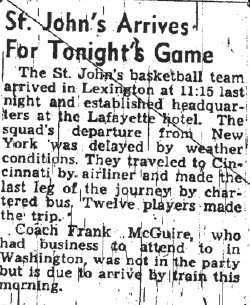

This practice continued throughout the 1950s & 1960s at both the Phoenix & Lafayette) on through to when the 1964 Civil Rights Act took effect. It's known that in the rare times of issues, Rupp personally came down to the hotel to ensure visiting teams were treated respectfully. 

(14:02) James Bolin: "Although Rupp changed basketball in Ky in the South, and he changed Ky. Ky very much changed Rupp. He was very much a joiner and to fit in with the society in Lexington. I think he adopted some of Lexington's prejudices"
Sorry don't agree with that.
Sorry don't agree with that.
Rupp did a lot of things many might consider radical. Evidence above where he personally negotiated with Lexington hotels to open themselves up to integrated teams.
Rupp also did things like hold clinics for black coaches in 1930's & 1940's, things he didn't need to do.
Rupp also did things like hold clinics for black coaches in 1930's & 1940's, things he didn't need to do.
(16:50) Thank God for Dave Kindred @DaveKindred. If anyone seems to really get basketball in Kentucky at a visceral level, it's Kindred, who is not even a Kentucky native.
Author of "Basketball: The Dream Game in Kentucky"
BTW, not sure why Alexander Wolff is even on this show?
Author of "Basketball: The Dream Game in Kentucky"
BTW, not sure why Alexander Wolff is even on this show?

(18:15) Talks about 1st ever college game in 1893 between Vanderbilt & Nashville YMCA. This is where documentary should have really started.
I recently had a Twitter thread talking about the very early games by schools which became SEC members.




I recently had a Twitter thread talking about the very early games by schools which became SEC members.
https://twitter.com/bigbluehistory/status/1619832449248428033?s=20&t=BVIyUv7su04jL9k6YmjKNA




(18:25) Andrew Maraniss mentions Vandy's old gym now being adminstration building. This is an area they could have explored.
Much of history was dictated by schools providing facilities to play basketball. Same story at UK when they built the Admin Bldg in 1902 with gym.

Much of history was dictated by schools providing facilities to play basketball. Same story at UK when they built the Admin Bldg in 1902 with gym.


In fact I wrote a whole two-part article discussing the progression of basketball facilities from the early beginnings to today which illustrate how they helped shape, and themselves were shaped by the game of basketball over the decades.
bigbluehistory.net/bb/arenas.html

bigbluehistory.net/bb/arenas.html

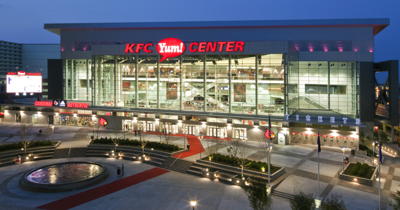
Beyond that, schools with access to local YMCA gyms & older opposition benefitted. Whether it was the Knoxville YMCA, Atlanta Athletic club, Nashville Ramblers, Birmingham AC etc., these were testing grounds for college players who often had never played the sport previously. 

For example UK often faced local semi-pro teams consisting of the Guyn and Yancey brothers, alumni of State College & Transylvania.
Louisville had many great players from Eugene Converse, the Seelbach brothers, Slew Jansing, Charles Lehmann etc.

Louisville had many great players from Eugene Converse, the Seelbach brothers, Slew Jansing, Charles Lehmann etc.

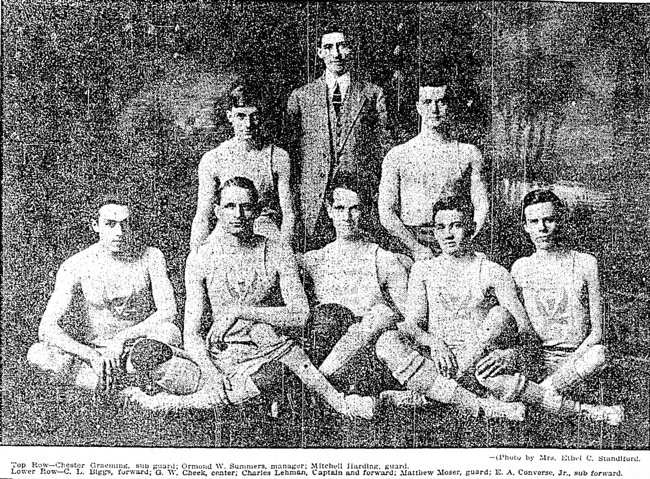
(18:35) "Despite their pedigree the Commodores like the rest of the SEC were always miles behind the Kentucky Wildcats at mid-century."
Maybe true once Rupp arrived but prior that not really accurate. There's a whole history of great teams & players which are completely ignored.
Maybe true once Rupp arrived but prior that not really accurate. There's a whole history of great teams & players which are completely ignored.
A huge part of Southern basketball was the formation of the SIAA and creation of a post-season tournament of schools numerous across the South.
This was the forefather of the Southern, Atlantic Coast & SEC conferences.
The 1st tournament was held in 1921 in Atlanta.
This was the forefather of the Southern, Atlantic Coast & SEC conferences.
The 1st tournament was held in 1921 in Atlanta.

I talk about this in detail in the following mini-website:
bigbluehistory.net/bb/SC/index.ht…
Even though Kentucky won the 1st Championship game vs. Georgia, there were many great teams & champions, and many developments of the game itself.
bigbluehistory.net/bb/SC/index.ht…
Even though Kentucky won the 1st Championship game vs. Georgia, there were many great teams & champions, and many developments of the game itself.

Some of the great tourney players included Georgia Tech's "Tiny" Hearn, Vanderbilt's Jim Stuart, Alabama's Lindy Hood (shown at left), Auburn's Jack Stewart, LSU's Sparky Wade & UK's Forest Sale & John DeMoisey among others.
Some started looking like modern basketball players.
Some started looking like modern basketball players.

Leroy Edwards & UK facing NYU in MSG in 1935 was already mentioned, a game which broke the world record for attendance of a collegiate game.
Both Kentucky & LSU claimed the SEC title that year, with undefeated conference slates, after not playing each other & tourney cancelled.
Both Kentucky & LSU claimed the SEC title that year, with undefeated conference slates, after not playing each other & tourney cancelled.

Louisiana State with stars Sparky Wade & Buddy Blair were invited to play a game vs. Doc Carlson's Pitt in the American Legion Bowl at Atlantic City.
LSU won the game 41-37 and deigned to call themselves National Champions (which wasn't really a thing at time).
LSU won the game 41-37 and deigned to call themselves National Champions (which wasn't really a thing at time).

Meanwhile Tennessee, having built a new arena was eager to restart the SEC post-season tournament & host it in Knoxville to reduce expenses.
Their coach John Mauer, was UK coach prior to Rupp & built tough teams with stars like Harry Anderson, Bernie Mehen & Gilbert Huffman.
Their coach John Mauer, was UK coach prior to Rupp & built tough teams with stars like Harry Anderson, Bernie Mehen & Gilbert Huffman.

Later in 1941 the SEC tournament was moved to Louisville's Armory, where it enjoyed large crowds. Rival SEC coaches objected, as they felt it was too much of an advantage for UK, but they couldn't dispute the attendance numbers.
bigbluehistory.net/bb/Statistics/…
...more to come...

bigbluehistory.net/bb/Statistics/…
...more to come...


The SEC Tourney in '40s was intense. Often teams had to play twice in the same day, 1 in late morning & later in the early evening. It was physically gruelling, which favored deep teams like Rupp typically had. UK made championship game each year, going 8-2 in L-Ville to 1950. 



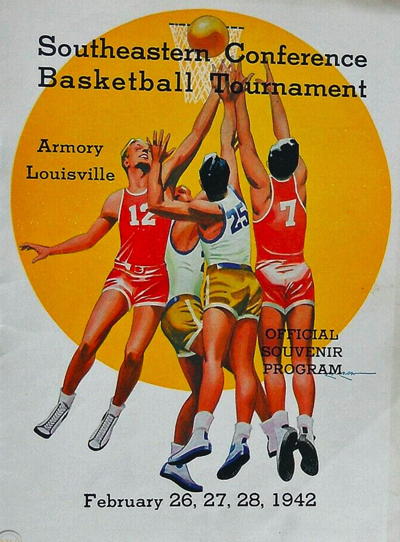


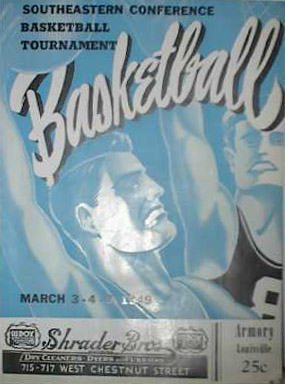
(19:35) Mentions Vandy upsetting UK in 1951 in SEC tourney at the Louisville Armory. What wasn't really explained was despite the victory, UK got NCAA bid.
bigbluehistory.net/bb/Statistics/…
The SEC, tired of UK winning tourney decided to let reg season conf champ go to NCAA. That was UK.



bigbluehistory.net/bb/Statistics/…
The SEC, tired of UK winning tourney decided to let reg season conf champ go to NCAA. That was UK.


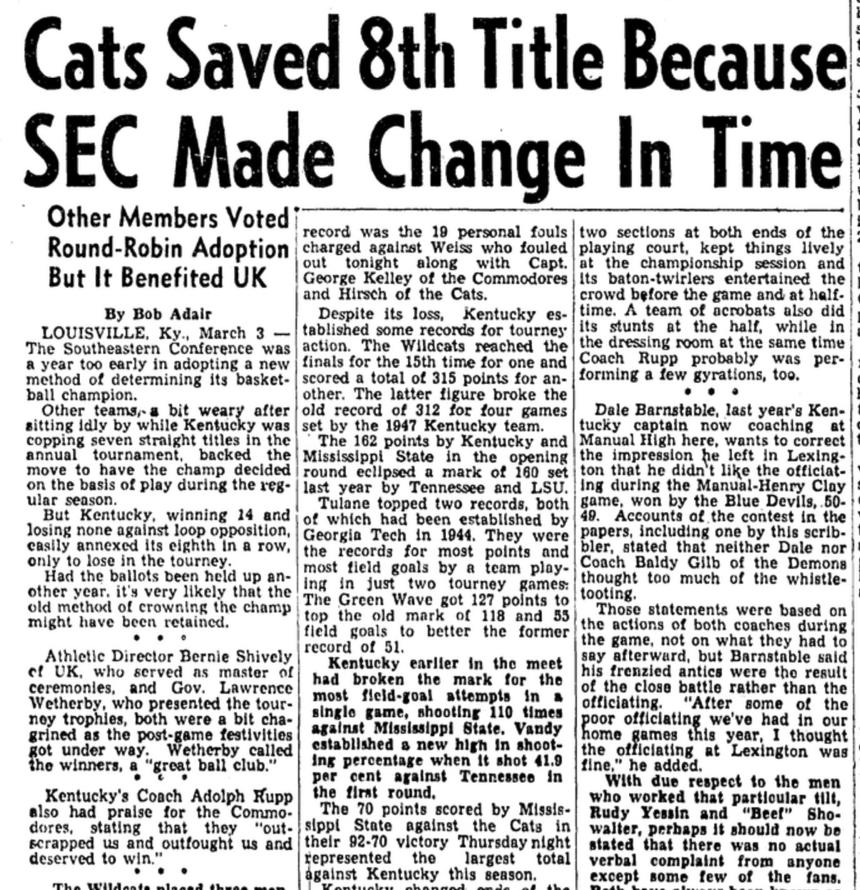

(24:13) [With regard to 1951 Gambling Scandal] "Investigators couldn't tie Rupp to gambling, though it was revealed he had connections to bookies, and paid players especially after big victories"
I discuss the gambling scandal in detail on this page:
bigbluehistory.net/bb/Statistics/…
I discuss the gambling scandal in detail on this page:
bigbluehistory.net/bb/Statistics/…
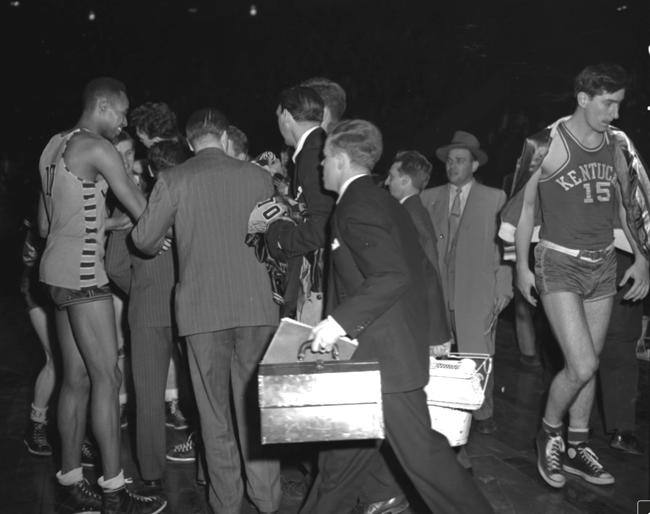
Nick Englisis, the gambler who roped the UK players into the scandal admitted he took precautions & went out of his way to avoid Rupp finding out, because he knew it would be all over if he had.
Rupp did admit to knowing Lexington gambler Ed Curd socially, but that was extent.

Rupp did admit to knowing Lexington gambler Ed Curd socially, but that was extent.


As far as awarding players money after games, Rupp admitted he (with the school's blessing) gave players $50 for particpating in the Sugar Bowl event in New Orleans.
Football players were given ~$200-$250 at bowl games for expenses with conference consent at time.

Football players were given ~$200-$250 at bowl games for expenses with conference consent at time.


(24:45) "The NCAA banned Kentucky from playing basketball, for the 1952-53 season"
Not quite. The SEC suspended UK's schedule for 1952-53, despite not specifying any charges. The NCAA actually missed their opportunity to formally sanction UK before season began...
Not quite. The SEC suspended UK's schedule for 1952-53, despite not specifying any charges. The NCAA actually missed their opportunity to formally sanction UK before season began...
But SEC commissioner Bernie Moore, supposed to be UK's advocate to NCAA, actually stabbed UK in the back & pushed NCAA to adopt an informal ban by threatening other member institutions not to play the Wildcats.
Moore's deceit wasn't revealed until decades later by Walter Byers.

Moore's deceit wasn't revealed until decades later by Walter Byers.
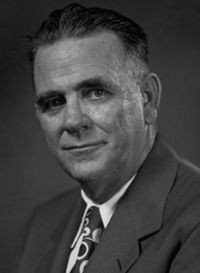

As it stood, UK could have appealed & by NCAA executive director Walter Byers' own admission, would have likely won if it had gone to a vote by NCAA members in Jan '53 meeting. Instead UK's Ab Kirwin & Leo Chamberlain agreed to the sanctions without appeal.
UK's season was done.

UK's season was done.


The response by the nation's media was mixed, with some taking shots at Rupp and Kentucky, but many making note of the hypocrisy given the many other examples of payment to players, especially in football.
Only the Kernel's Tom Easterling smelled a rat with Bernie Moore at time.
Only the Kernel's Tom Easterling smelled a rat with Bernie Moore at time.
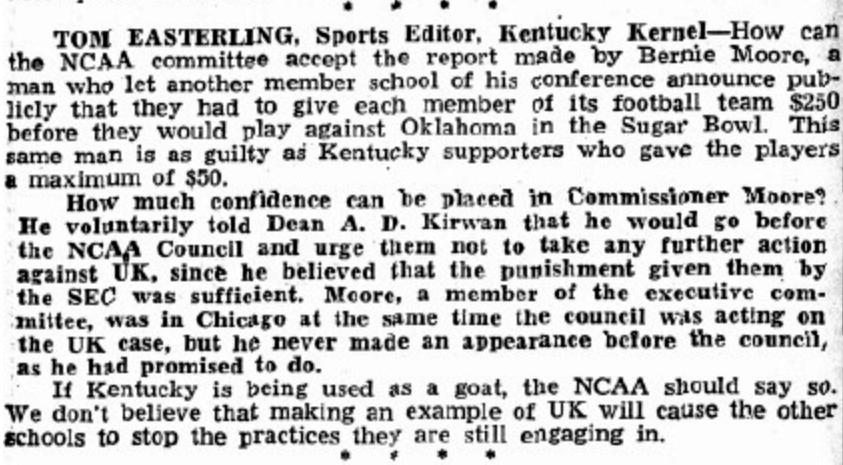
(28:48) Bob Pettit talks about competing with Furman's Frank Selvy for NCAA scoring record.
UK Assistant Coach Harry Lancaster talks in his book about missing out on recruiting Selvy, who was taken away by a rival recruiter after an All-Star game.

UK Assistant Coach Harry Lancaster talks in his book about missing out on recruiting Selvy, who was taken away by a rival recruiter after an All-Star game.
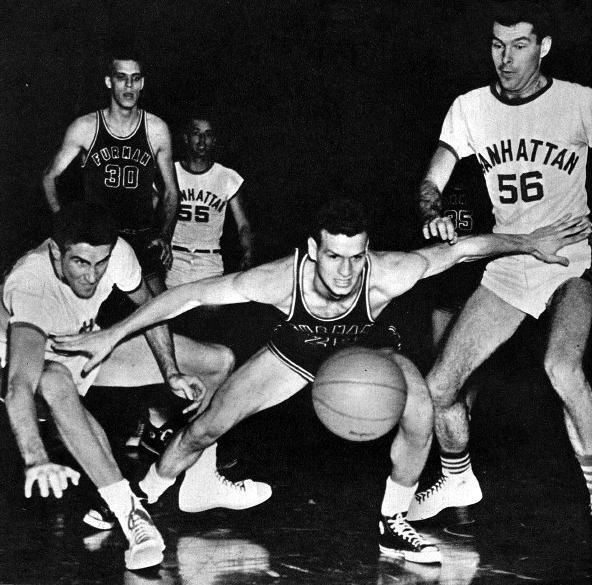

(29:16) "With Ky still dealing with the effects of the gambling scandal, the (LSU) Tigers went to the NCAA tournament in both 1953 & 54"
One impact of scandal was in '53 with UK out, SEC cancelled their tourney, knowing attendance would be dismal. It wouldn't return until 1979.
One impact of scandal was in '53 with UK out, SEC cancelled their tourney, knowing attendance would be dismal. It wouldn't return until 1979.

(29:52) Jim Engster: "And LSU has been blessed with three generations of really once in a lifetime players: Pettit in the 50's, Maravich in the 1960's and the 1970, and then Shaquille O'Neal in the late 80's and early 90's."
Don't forget Sparky Wade in the 1930's!
Don't forget Sparky Wade in the 1930's!

(30:38) Bolin: "When the NCAA advised other teams not to play Kentucky, Ky cancelled the season. So it was the 1st cancelled season in NCAA history."
True if you're talking sanctions but there've been plenty of cancelled seasons for various reasons, in particular during WWII.
True if you're talking sanctions but there've been plenty of cancelled seasons for various reasons, in particular during WWII.
The 25-FEB-1956 game vs. Alabama's "Rocket 8" was the 1st time an opposing team scored 100 points on UK. The game was held in Garrett Colisuem in Montgomery. Jerry Harper scored 37 points, a record by any UK opponent at time.
bigbluehistory.net/bb/Statistics/…

bigbluehistory.net/bb/Statistics/…


Alabama coach Johnny Dee had previously played against UK while with Notre Dame.
He and Rupp had many verbal sparring matches. Dee likened Rupp's gaudy record against SEC foes as: "going down to Texas with six kids from Canada to start a hockey league."
...more to come...


He and Rupp had many verbal sparring matches. Dee likened Rupp's gaudy record against SEC foes as: "going down to Texas with six kids from Canada to start a hockey league."
...more to come...
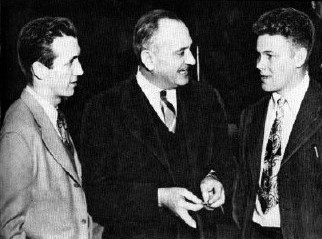
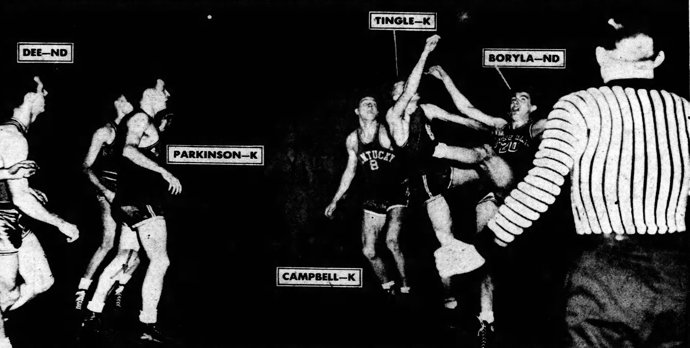

The Pat Summit section. Again, the history of women's 🏀 in South deserves its own documentary.
Don't know about other schools but at UK the women's team preceded the men's, with the hiring of Florence Offutt as physical instructor in 1901.
Don't know about other schools but at UK the women's team preceded the men's, with the hiring of Florence Offutt as physical instructor in 1901.

After the gymnasium was open in the Winter of 1901/02, student's took interest and used the location to meet and dance, much to the school administrator's consternation.
But it wasn't until the following year that reportedly saw the formal beginning of intercollegiate games.

But it wasn't until the following year that reportedly saw the formal beginning of intercollegiate games.


The person credited with proposing a game between the women of State College & Kentucky University (now Transylvania) in March of 1903 was Jane Todd Watson who served as coach. Unlike the boys team, they won their game 16-10, with Jane Pence as captain. 







Games were heavily restricted, typically males were forbidden from watching. In 1904 student Herman Scholtz dressed up as a woman to watch a State game versus Georgetown College, but he was caught halfway through and banished from the game. 

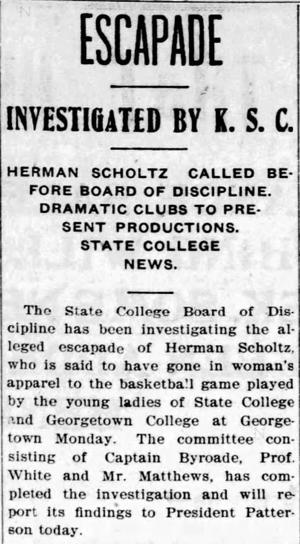

There were many other incidents over the years, with disputes over which game ball to use, to how long each half should be, to whether bloomers should be worn or not, such as below game in 1904 with Jessamine Institute. 

The women's program continued through the 1920s. Often-times they were coached by male student-athletes. In 1923 they were coached by A.B. "Happy" Chandler, with Sarah Blanding as captain (shown with ball in center of photo). 
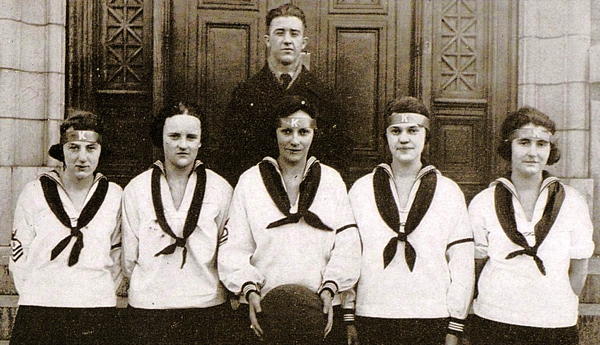
However by the following fall, with Blanding having graduated & now an assistant under Florence Offutt Stout, women's🏀 was abolished. Perhaps surprisingly as both were supportive & in fact pushed the decision. One reason cited (beyond costs) was it "was too strenuous for girls".
Organized women's basketball against outside competition wouldn't return to UK until the 1970's.
What the story was at other SEC schools, I don't know, but again that would be good for a dedicated documentary.
(more to come)
What the story was at other SEC schools, I don't know, but again that would be good for a dedicated documentary.
(more to come)

Addendum from earlier. It's actually Albert "Ab" Kirwan, not Kirwin.
And for anyone reading this thread who may have been wondering, yes, it is the very same Ab Kirwan and Sarah Blanding you're thinking of.
And for anyone reading this thread who may have been wondering, yes, it is the very same Ab Kirwan and Sarah Blanding you're thinking of.

(42:10) Bolin: "When they were doing exhibition games in preparation for the '48 Olympics, Barksdale wouldn't even get to stay with the rest of the players in the hotel when they played in Lex."
True, but he also couldn't stay with Oilers during training in Bartlesville OK.
True, but he also couldn't stay with Oilers during training in Bartlesville OK.

Rupp did have some contacts in the black community (including earlier H.A. Kean & then J.B Brown at KSU, Sanford Roach at Dunbar HS etc.) & somehow arranged for Barksdale to stay with local physician Dr. J.R. Dalton. The black community held a festival in Barksdale's honor. 



(43:10) "3 years later in 1951, St. Johns came to Lex, they were an integrated team & Solly Walker, their star guard would be the 1st Af-American to play in Mem. Col.."
Slight exaggeration. Walker was a largely unknown soph (1st year of varsity). He was 6th in scoring (4.2 ppg).
Slight exaggeration. Walker was a largely unknown soph (1st year of varsity). He was 6th in scoring (4.2 ppg).

And just to clarify, yes in 1948 Rupp helped secure housing for Don Barksdale when no hotel would accept him. But in preparation for Dec 1951 St. John's Rupp had secured agreement with Lexington hotels to allow integrated teams to stay, a policy which held throughout 50s & 60s.
(43:45) "All this, a year after Rupp had helped Jim Tucker, a black HS star from Paris Ky, get a scholarship at a college up north, Duquesne."
True, Tucker became an All-American at Duquesne. and he wasn't the only local black player to benefit from Rupp's recommendation.
True, Tucker became an All-American at Duquesne. and he wasn't the only local black player to benefit from Rupp's recommendation.
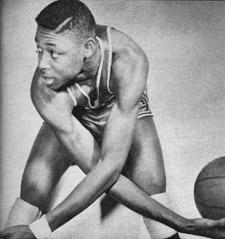
But just as telling but underreported is that after Tucker graduated in 1954, Rupp by his own volition added him to a KY-IN Collegiate All-Star game, when Rupp as coach of team very easily could have ignored him (particularly since he hadn't played collegiately for a KY college). 

(45:00) Mississippi State star Bailey Howell mentions having to cancel a game in Evansville IN DEC 1957 because Mississippi state politicians found out they played against U of Denver with 2 black players.
This became a bigger & bigger problem for Southern schools in the 1950's.


This became a bigger & bigger problem for Southern schools in the 1950's.



Not for Kentucky as they already were not only playing against but hosting integrated teams on their campus. So many that they're too numerous to mention.
Kentucky also replaced Miss State twice ('59 & '61) & Alabama ('56) in NCAA tournament (UA may have been due to eligilbity).

Kentucky also replaced Miss State twice ('59 & '61) & Alabama ('56) in NCAA tournament (UA may have been due to eligilbity).

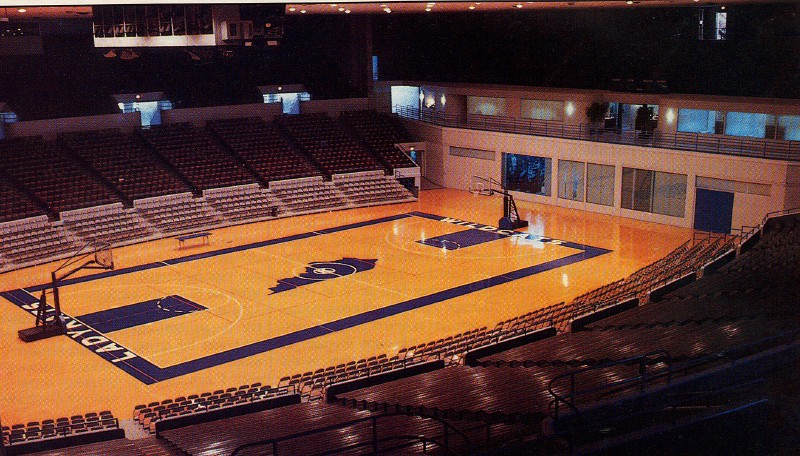
But not completely clear of controversy. At same time as Evansville incident UK played in Sugar Bowl tourney in New Orleans. Notre Dame, Dayton & St. Louis had cancelled due to 1956 LA law forbidding interracial competitions in State.
Ky considered dropping out but chose to play.
Ky considered dropping out but chose to play.

Alabama, Houston & Va Tech took their place.
Ky received criticism for not boycotting Sugar Bowl over issue too, but at time they were facing SEC opponents Tulane & LSU making it contractually difficult & hypocritical to boycott one event & not all.
UK won tournament of course.
Ky received criticism for not boycotting Sugar Bowl over issue too, but at time they were facing SEC opponents Tulane & LSU making it contractually difficult & hypocritical to boycott one event & not all.
UK won tournament of course.
(50:35) Wolff: "Rupp had all sorts of human qualities: Arrogance, stubbornness, that kind of pride that comes with sucess, all of which if you kind of blend together causes someone, well it's sort of the seed of bigotry. Judging people reflexively & not being willing to change." 

Strong words from someone who has proven time & time again to be ignorant of Rupp & who I don't think he ever met. Have you @alexander_wolff ?
Since the late 1980's Wolff & his SI cohorts have been prime instigators in creating false or at best misleading claims about Rupp.
Since the late 1980's Wolff & his SI cohorts have been prime instigators in creating false or at best misleading claims about Rupp.
One example: in his book Raw Recruits (which was a hack job BTW) with regard to Ky agreeing to take the place of Miss. State in NCAA tourament, Wolff made the wild & frankly bizarre claim that it was because "It gave him [Rupp] a chance to confirm his notions of white supremacy."
Wolff also numerous times referenced a request that Rupp supposedly asked of NYC newspaperman Jimmy Breslin to "kindly indicate 'colored' HS players with asterisks" on scoring lists & boxscore of New York prep players that Breslin sent to Rupp.
Certainly sounds bad, but Wolff never gives context that at the time, Rupp was not permitted by UK to recruit black players, so spending time on them truly would have been a waste of time.
Despite that, Rupp reportedly did travel to Philadelphia to watch Wilt Chamberlain play.
Despite that, Rupp reportedly did travel to Philadelphia to watch Wilt Chamberlain play.

BTW, inadvertently showing interest in black players was not unheard of. Frank McGuire, both at UNC in 1950's & at South Carolina in 1964 with Wes Unseld initially expressed interest in a recruit, only to be forced to backtrack when boosters discovered they were black. 

Another example, Wolff claimed in 31-MAR-2016 SI article about Texas Western-UK game in 1966: "Rupp, who adamantly refused to recruit black players."
Sorry, NO HE DIDN'T! Rupp wanted to recruit black players & said so. And when he was finally given the green light, he did so.
Sorry, NO HE DIDN'T! Rupp wanted to recruit black players & said so. And when he was finally given the green light, he did so.
Rupp was vocally against *tokenism*, which I'm sure we'll need to discuss in Part II. Wolff is obviously confused about the issue & never learned the facts. He just continues to regurgitate the same BS decade after decade. I tried to give him a clue back in 2016. 
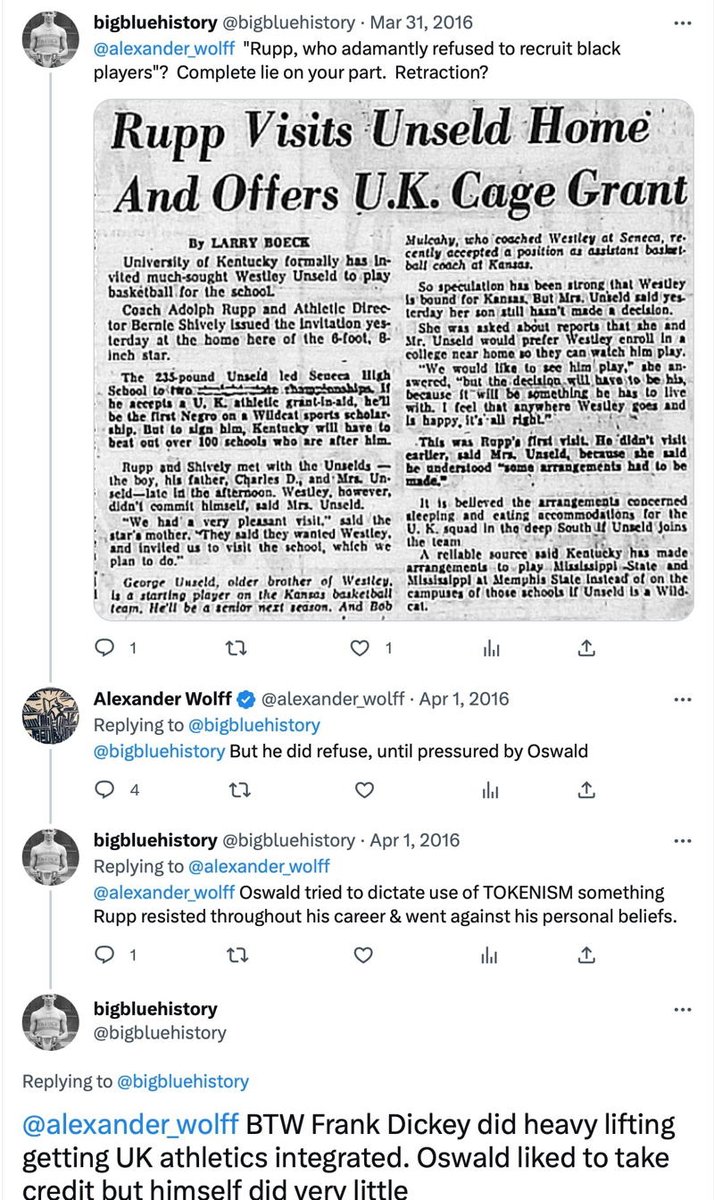
Sad thing is that immediately after 1966 game, Harvey Yavener of Trentonian wrote article accurately discussing state of racial situation. He didn't blame Rupp, because he knew Rupp was recruiting black players at time. Although he poked fun at idea someone might try someday. 

In comparison since late 80's Wolff & Curry Kirkpatrick along with John Feinstein & Frank Fitpatrick etc. embarked on a blitz of increasingly outlandish slander against Rupp. Perhaps not realizing the days of the media saying anything they want without any scrutiny were over.
In the push to deify UNC coach Dean Smith & frankly anytime the Texas Western game was mentioned, it seemed to give license to dredge up & repeat any crazy rumor or innuendo they could find, regardless of whether it was substantiated or if it made sense at all given the facts. 
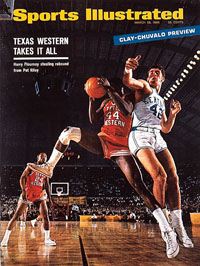
Frankly many sportswriters jumped on what they assumed was a story of good vs. evil without taking time learning the facts. Many destroyed their journalistic reputation in the process.
Thankfully many people who actually knew Rupp have spoken out & the facts have become known.
Thankfully many people who actually knew Rupp have spoken out & the facts have become known.

And yet, here we have Alex Wolff, apparently not having learned a thing over the course of 3 decades with regard to this issue, sanctimoniously & hypocritically telling us how Rupp was not willing to learn & not willing to change.
Seriously? Why is he even in this documentary?
Seriously? Why is he even in this documentary?
Not that Wolff it incapable of learning and growing. After unfairly villifying former UK player Eric Manuel in Raw Recruits, Wolff to his credit did follow up in a 11-FEB-1991 Sports Illustrated article which was much more balanced and fair called "Odd Man Out".
So there's hope!
So there's hope!
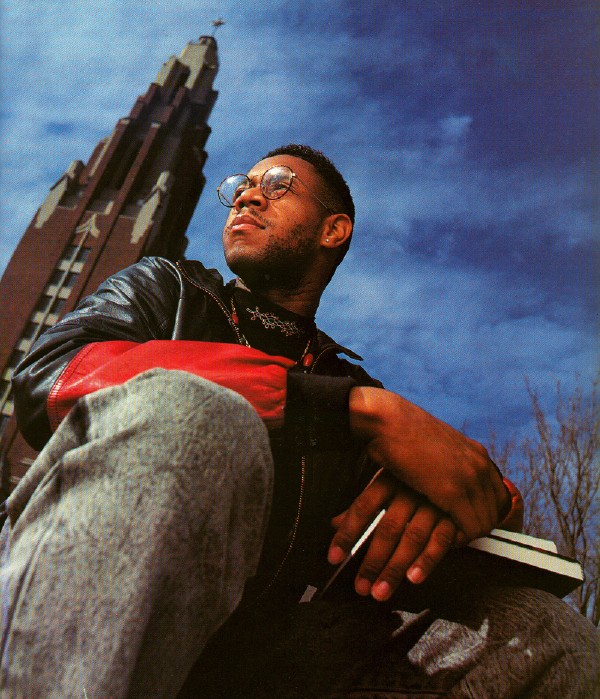
Thankfully, since the wildly irresponsible 90's, most in the media have finally recognized this isn't as cut & dried a portrayal as many were led to think.
Good counter evidence has been made known showing how complex this issue is & calls into question why it focuses on Rupp?
Good counter evidence has been made known showing how complex this issue is & calls into question why it focuses on Rupp?
The media giants for the most part have recognized this & tend to step back & present it as a 'debate'. Yet there's really no debate. People can conclude what they want about Rupp, but at least right now the only 'debate' is between those who know the facts & those who don't.🤷♂️
For my part, I'm waiting for Rupp critics to finally turn their indignation toward the numerous other coaches & administrators & fans who actually were impeding integration, rather than focusing & scapegoating one of the few who was actually working to integrate, and succeeded. 

(51:27) Gerald Smith "Even though they were being recruited, these players were being reminded that, OK, if you come here, there's no guarantee that we can protect you from the hostility you're going to encounter in the Deep South."
True, Rupp was upfront with black recruits...
True, Rupp was upfront with black recruits...
In some cases, UK made accommodations, like getting Ole Miss & Miss St to agree to play 'home' games in Memphis, as part of recruiting pitch to Wes Unseld in 1964.
Some critics apparently thought Rupp should lie to recruits, but I think he made the right decision being honest.
Some critics apparently thought Rupp should lie to recruits, but I think he made the right decision being honest.

Tokenism, honesty & dealing with educational inequalities in the face of higher standards were some of the very real issues facing those trying to integrate athletics in the 60s South. So too gaining support from the black community to help schools which previously shunned them.
Noteworthy to me that in 80's & 90's Dean Smith & John Thompson were lauded as civil rights heroes for pointing out institutional inequities of educational opportunities between blacks & whites.
When Rupp did same in 60's, he was villified, by both sides of spectrum.
When Rupp did same in 60's, he was villified, by both sides of spectrum.

Some would rather embrace the simplistic idea that it was a matter of Rupp simply snapping his finger.
Others are more than happy to look back 60+ years to cast stones at Rupp but unwilling to go any further to consider their own school's history with regard to integration. 🤷♂️
Others are more than happy to look back 60+ years to cast stones at Rupp but unwilling to go any further to consider their own school's history with regard to integration. 🤷♂️
It's frankly not surprising to me that ESPN & Sports Illustrated & other media giants are more than happy to continue to poke at Rupp forever. It gives everyone else a free pass.
But they're completely misrepresenting & missing the real story IMO.
(End of review of Part I) 🛑🧵
But they're completely misrepresenting & missing the real story IMO.
(End of review of Part I) 🛑🧵

• • •
Missing some Tweet in this thread? You can try to
force a refresh
















